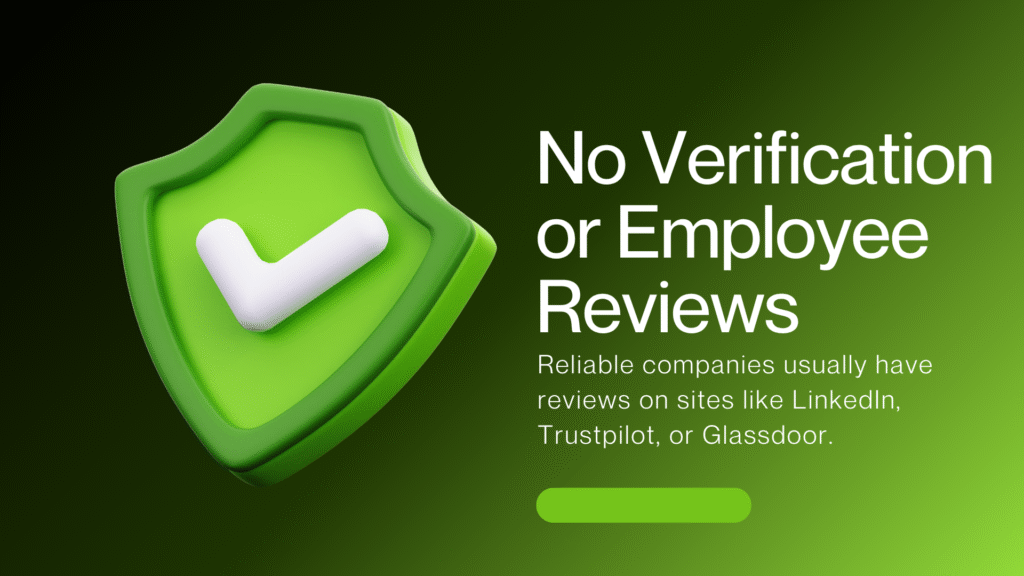How to Know If a Job Posting Is Real or Fake: 7 Red Flags to Watch For
Let’s face it — job hunting online can be stressful. You spend hours updating your resume, applying to listings, and waiting for replies, only to realize that some postings aren’t even real. With online scams growing every day, it’s more important than ever to know how to spot fake job listings before wasting your time or risking your personal information. To help you stay safe, here are seven major red flags that can help you identify whether a job posting is legitimate or fake.
1. Unprofessional Communication
The first thing you should notice is how the employer communicates. Real companies usually use professional email addresses linked to their official domain (like @companyname.com). If you receive emails from personal accounts such as Gmail, Yahoo, or Outlook, it’s an immediate warning sign. Legitimate recruiters also use proper grammar, polite tone, and structured messages. Poorly written or rushed emails could mean the posting is fake.
Additionally, if the recruiter avoids video or phone interviews and insists on only chatting through text or social apps, that’s another strong indicator of a scam. Professional recruiters value proper communication and transparency.
2. Unrealistic Salary and Benefits

If something sounds too good to be true — it probably is. Be cautious when a job offers unrealistic pay or benefits for minimal qualifications. Scammers often use this trick to attract desperate job seekers. For instance, if a basic entry-level job claims to pay extremely high wages or promises bonuses, cars, and accommodation right from day one, it’s likely fake.
Real employers clearly list realistic compensation based on your experience and the industry standard. Always research the average salary for the position before applying.
3. No Company Information or Online Presence
Every genuine company leaves a digital footprint. Before applying, take a few minutes to check the organization’s website, LinkedIn profile, and social media presence. If you can’t find any verifiable online information, or if the company name leads to unrelated websites, it’s a major red flag.
Our recruiting platform helps you by verifying the company’s authenticity. You can see details like how many followers they have, what their AI reputation score is, and what reviews real employees have left on trusted platforms such as Glassdoor or Trustpilot. This helps ensure that you only apply to verified and trustworthy job listings.
4. Upfront Payment Requests
One of the biggest warning signs of a fake job post is any request for payment. Legitimate employers will never ask you to pay for interviews, application processing, or training materials before hiring you. If the job listing mentions fees for registration, background checks, or mandatory “starter kits,” stay away.
Scammers often ask for small payments at first, claiming it’s refundable later — it never is. A real company invests in its employees, not the other way around. Always research and report any listing that requests payment.
5. Vague Job Descriptions and Missing Details
Fake job postings often have vague job descriptions that don’t clearly define responsibilities, qualifications, or reporting structure. If the job listing doesn’t specify your role or the type of work you’ll be doing, that’s a red flag.
Authentic postings provide a proper job title, detailed responsibilities, required skills, and experience level. They usually include contact details, company background, and the exact location of work. Scammers deliberately keep things unclear to attract more applicants and gather personal data. Always double-check the posting for missing information before applying.
6. Suspicious Interview Process
Once you apply, pay attention to how the interview process goes. Fake employers often rush the hiring process — sometimes offering you the job without an actual interview. If you get hired immediately after a short chat or email exchange, be skeptical.
Real companies conduct formal interviews, whether online or in-person. They may also use video interviews and ask job-related questions to assess your skills. Another red flag is when the recruiter avoids using official company platforms for meetings and asks you to install unfamiliar apps. Always verify the recruiter’s identity and cross-check with the official company website before proceeding.
7. No Verification or Employee Reviews
Transparency is a key sign of authenticity. If you can’t find any employee reviews or verifiable feedback about the company, it’s best to be cautious. Reliable companies usually have reviews on sites like LinkedIn, Trustpilot, or Glassdoor.

If a job listing is missing this information, or the company is too new with no history, double-check before applying.
Our job verification system makes this process easier. We analyze data from trusted sources, including social media, employee reviews, and company ratings, to provide an overall verification score. This helps you quickly identify whether a company is genuine or suspicious.
8. How Our Platform Protects You
To make your job search safer, our recruiting website includes a job verification system that filters out suspicious listings before they reach job seekers. We use advanced AI algorithms to check every company’s background, online presence, and employee feedback. You can also report fake jobs directly through our platform, and our team will investigate and publish verified results.
This ensures that only trusted and authentic listings appear on your screen, helping you save time and avoid potential scams. You’ll always know whether a company is reliable before even clicking “Apply.”
9. Quick Tips to Stay Safe
Before applying to any job online, always:
- Research the company and verify its website.
- Look for employee reviews and online presence.
- Avoid sharing personal details like bank information or IDs too early.
- Be cautious of offers that sound too good to be true.
- Use platforms with verified listings for your job search.
Following these small steps can make a huge difference in protecting your time and personal data.
Conclusion
Job hunting should be about opportunities, not risks. Unfortunately, scammers are becoming smarter — but so are job seekers. By learning to identify these red flags, you can avoid fake job postings and focus only on genuine opportunities. Our platform is built to protect your career journey through advanced verification tools and transparent company insights. So next time you search for a job, remember: a real opportunity will never ask for your money — only your talent, skills, and passion.


